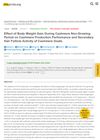signaling protein that, when suppressed, may grow hair by reducing inflammation and stem cell loss
Heavy duty finasteride that comes with higher risks, but scalp injections seem safe and are gaining popularity
An essential vasodilator with some anti-androgenic effects, has excellent safety record

